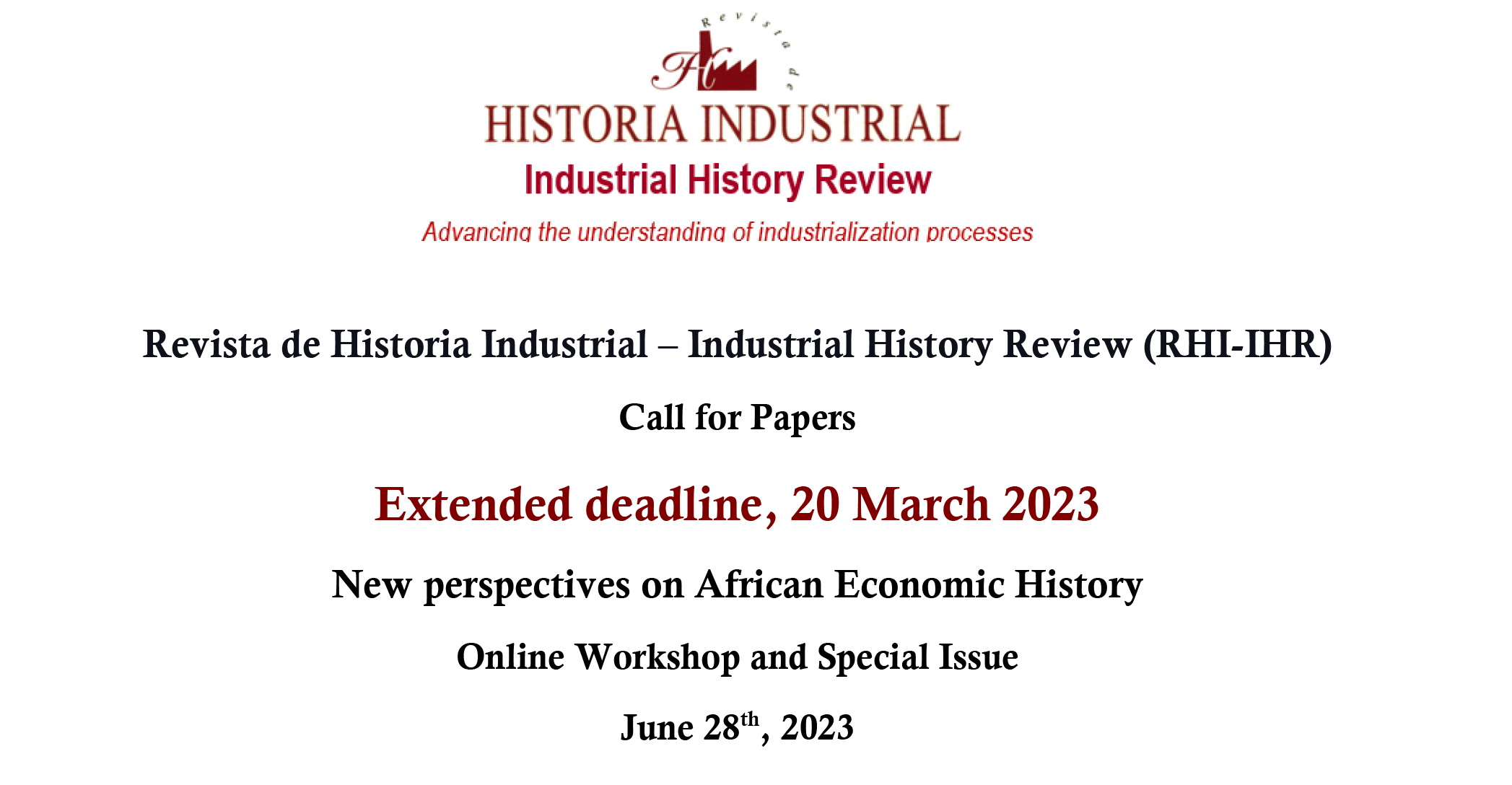Call for Papers: New perspectives on African Economic History

Introduction
The Revista de Historia Industrial–Industrial History Review would like to invite you to submit a paper proposal for an online workshop on “New perspectives on African Economic History” (June 28th, 2023). It will be organized by Kate Frederick (Utrecht University), Dácil Juif (Universidad Carlos III de Madrid) and Felix Meier zu Selhausen (Utrecht University). The workshop is aimed at selecting five papers to be included in a special issue, co-edited by the workshop organisers, to be published in 2024.
Content
African Economic History has witnessed a true “renaissance” over the last two decades (Austin and Broadberry 2014). Its rise has been characterized by a “data revolution” as well as the use of advanced data analysis techniques (Fourie and Obiliki 2019). Studies exploring either persistence or, alternatively, long-term dynamic processes in African development have surged relative to other world regions. One potential reason is that, while Asian economies experienced high catch-up growth and industrialization over the past four decades, Africa’s economies remain exceptionally underdeveloped and primary-resource dependent (Broadberry and Gardner 2022, Frankema 2021). This has attracted scholarship exploring the historical roots of Africa’s economic volatility and relative poverty. At the same time, the fact that the majority of the world's future population growth is expected to occur on the African continent makes the study of long-term African development particularly pressing.
Almost a decade after the special issue on the “renaissance of African Economic History” was published in the Economic History Review (Austin and Broadberry 2014), research on Africa’s long-term development has further expanded. This special issue, to be published in 2024, aims to bring together current state of the art studies on the Economic History of Africa, dealing with (but by no means limited to):
* Structural transformation, incl. occupational change, urbanization, (in)formality
* Extractive and inclusive institutions, colonialisme
* Geography, climate, local factor endowments
* Taxation and state formation
* Human capital development
* Trade and finance
* Demographic transformations
* Wages, incomes and living standards
References
Austin, Gareth and Stephen Broadberry. 2014. ‘Introduction: The Renaissance of African Economic History.’ The Economic History Review, 67 (4): 893–906.
Broadberry, Stephen and Leigh Gardner. 2022. ‘Economic Growth in Sub-Saharan Africa, 1885–2008: Evidence from Eight Countries.’ Explorations in Economic History, 83: 101424.
Fourie, Johan, and Nonso Obikili. 2019. ‘Decolonizing with Data: The Cliometric Turn in African Economic History.’ Working Paper 02/2019. Stellenbosch Economic Working Paper Series.
Frankema, Ewout. 2021. ‘Why Africa is not that poor’. In The Handbook of Historical Economics, edited by Alberto Bisin and Giovanni Federico, 557-584. Academic Press.
Publication
After a process of double-blind review, to be carried out after the congress, five of the accepted papers will be selected for a Special Issue of the Revista de Historia Industrial – Industrial History Review edited by Kate Frederick, Dácil Juif and Felix Meier zu Selhausen, to be published in 2024. The remaining contributions, if accepted in the peer review process, can be published in regular issues of the journal.
Deadlines
- Applicants should submit an abstract of no more than 500 words outlining their proposal and a short CV by March 20, 2023 (extended deadline), to Dácil Juif (djuif@clio.uc3m.es).
- Applicants will be informed of the selection process by March 31, 2023.
- The paper – or alternatively a long abstract of 2,000 words – should be sent by June 4, 2023.
- The final version of the manuscripts for the Special Issue review process must be sent by October 31, 2023.
Barcelona, Madrid, Siena and Utrecht, December 1st, 2022
The Editorial Board of the Revista de Historia Industrial – Industrial History Review (RHI-IHR) and the Workshop Organisers.
Call for papers in pdf




